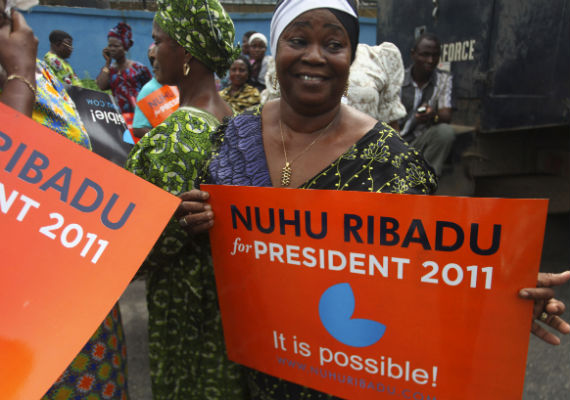Nigeria: An Election Deal?
More on:

There have been ongoing negotiations between Nigeria’s two biggest opposition parties, the Action Congress of Nigeria (ACN) and the Congress for Progressive Change (CPC) to unite behind a single candidate from the North, likely a Muslim, to challenge incumbent president Goodluck Jonathan, the Southern Christian candidate of the ruling Progressive Democratic Party (PDP). Today, in an Abuja press conference, the ACN presidential candidate Nuhu Ribadu, announced definitively that the negotiations were over and that he is remaining in the race.
Ribadu served as head of the Economic and Financial Crimes Commission until he was fired by the late President Umaru Yar’Adua’s attorney general. The assumption in the United States and among many in the Nigerian diaspora was that Ribadu was being forced out because his investigation of corruption was getting too close to senior political figures. In reality, the kingpin of the ACN is not Ribadu, but rather Bola Tinubu, the former governor of Lagos state. He is likely the one who decided that Ribadu, politically a neophyte, would not withdraw. By and large, the public does not see Tinubu as sharing Ribadu’s reputation as being squeaky clean on corruption. He is however respected as having been a competent boss of Lagos, one of the world’s largest cities.
The CPC’s presidential candidate, Muhammadu Buhari, is the former military ruler of Nigeria. With his simple lifestyle and devout Islamic beliefs, he is probably the most popular politician ‘on the street’ in Nigeria, especially in the North. Nevertheless, he is disliked by many elite Nigerians because of his hard-line stance on anti-corruption. He ran for the presidency and lost in the 2007 and 2003 elections, both of which had little credibility. Many observers believe that in both elections he received the most votes. Buhari challenged the election results in the courts, and in 2007 came within one Supreme Court vote of securing an overturn. Since then, he has said that he will not look to the courts again.
Both candidates are Muslims from the North, with Buhari eighteen years older and much better known than Ribadu. Like Nigerian political parties in general, the ACN and the CPC are political parties that chose candidates based on personality rather than principle. So it would have made sense for Ribadu to drop out in favor of Buhari and run again at some future date. Yesterday, some of the Nigerian and diaspora press was claiming that a deal had been struck, and that in return for leaving the race, Buhari would make Ribadu his chief of staff should he win the presidency. The ACN subsequently denied that there was any such agreement, and today Ribadu declared that he would remainin the race.
Though much ink was wasted on this possible deal in the Nigerian press, I am not sure it would have made much difference to the outcome of Saturday’s presidential vote. Buhari is the much stronger of the two candidates. Ribadu is probably more popular outside of Nigeria than he is at home, and it is unlikely that he will “split” the Northern vote to a significant extent. If the elections are free and fair, Buhari will likely to do very well regardless of whether or not Ribadu is in the race.
More on:
 Online Store
Online Store